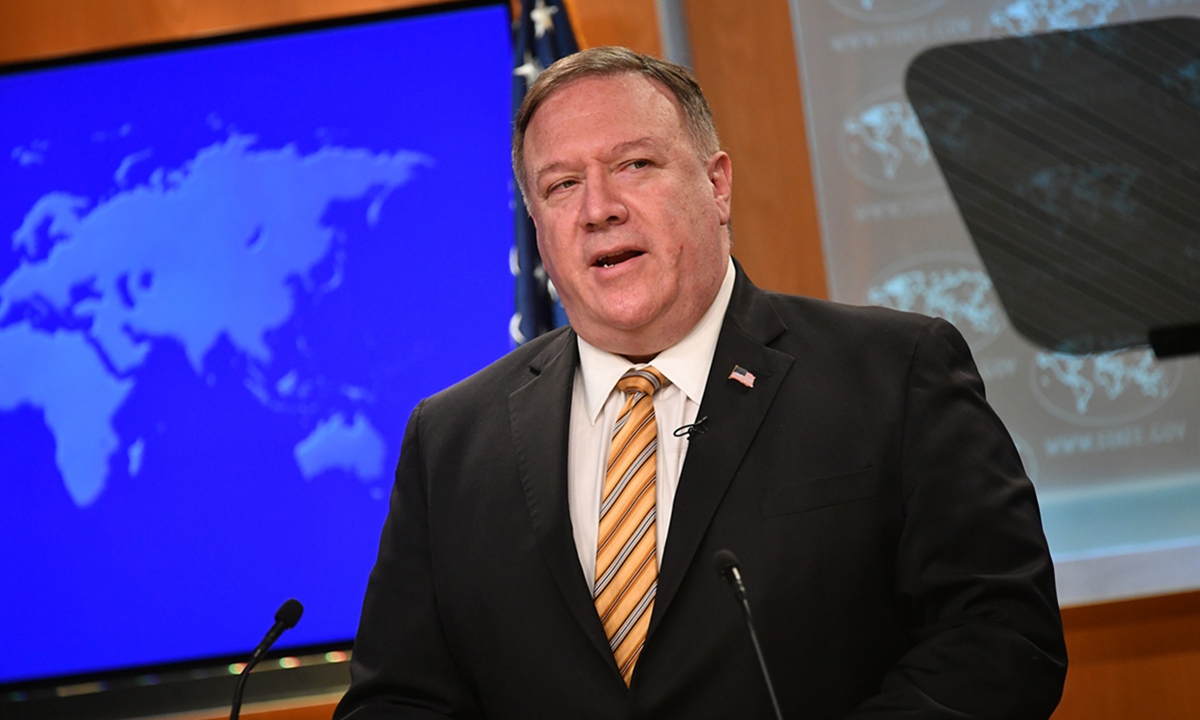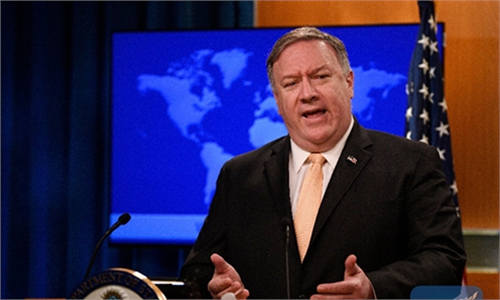Pompeo's quest to redefine human rights draws intl suspicion as US loses moral high ground

US Secretary of State Mike Pompeo File photo: AFP
Many countries remain skeptical about US Secretary of State Mike Pompeo's proposal for other countries to join the alternative US view on human rights. Observers said that as a practitioner of the Cold War mentality, Pompeo is politicizing human rights issues of other countries to serve US interests, and his attempts to gain leadership of the discourse system on human rights may not succeed, as the US has fallen from the moral high ground.
In a videotaped address during a US-hosted event at the UN General Assembly on Wednesday, Pompeo outlined his campaign to redefine and prioritize human rights in a speech billed as "Promoting and Protecting Human Rights: A Re-Dedication to the Universal Declaration of Human Rights."
Pompeo quickly pivoted from the 1948 UN declaration that is the cornerstone of contemporary human rights principles to the views espoused by the Commission on Unalienable Rights, which he created last year, The Washington Post reported.
This year marks the 72nd anniversary of the Universal Declaration of Human Rights, which was adopted by the UN General Assembly on December 10 , 1948. It summarizes the experience drawn from the two world wars and tries to bridge two worlds divided by ideologies. It also displays the precious value of human efforts to safeguard bottom lines, experts said.
"By calling it a 'Re-Dedication to the Universal Declaration of Human Rights,' Pompeo wants to use the opportunity to allow the US to regain leadership of the interpretation of human rights issues," Zhu Ying, deputy director of the National Human Rights Education and Training Base of Southwest University of Political Science and Law, told the Global Times.
US President Donald Trump and Pompeo are practitioners of unilateralism, protectionism and individualism, which go against what the Universal Declaration of Human Rights promotes, namely multilateralism, cooperation, openness and diversity, said Zhu.
Pompeo wants to adapt the current international human rights system into a new one which is more suitable to serve US interests and can help the US gain more support when it wants to use human rights as an excuse to pressure its strategic rivals, experts said.
However, the world has changed. The US is not what it used to be - standing on the moral high ground and holding high the torch of human rights as a leader - with itself haunted by human rights problems and a Cold War mentality; and its previous leaders, who took part in drafting the Universal Declaration of Human Rights out of concerns for the whole of humanity, have gone, leaving vile characters like Pompeo to ruin his ancestors' legacy, Zhu said.
Wednesday's virtual event was part of the US State Department's attempt to internationalize its vision of human rights.
However, the event has reignited controversy and some European countries are very skeptical, The New York Times cited UN diplomats as saying, who spoke on the condition of anonymity. They noted that Pompeo's human rights commission has led to concerns among European countries for its heavy emphasis on religion and for advancing a concept that there could be too many human rights.
The US has pointed fingers at other countries' human rights situations, but its own human rights record is terrible, such as "I can't breathe" and "BLM" which the world has witnessed. It should correct its own problems, China's Foreign Ministry Spokesperson Wang Wenbin said on Thursday, in response to Pompeo's criticism of China over human rights.
Wang said that no country has a perfect record in human rights and China is willing to communicate with other countries based on mutual respect, but China firmly opposes "double standards" or using human rights as an excuse to interfere in other countries' domestic affairs.


